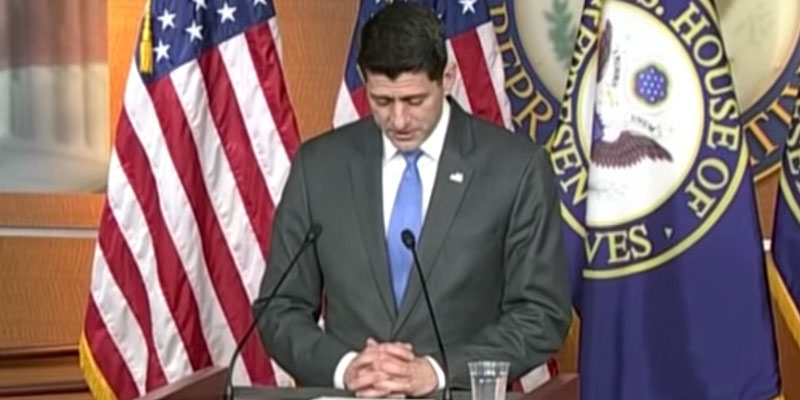Paul Ryan’s retirement from Congress marks the end for one of the most prominent Republicans of his generation. Even before taking the role of Speaker of the House, Ryan had managed to become, in the words of Mitt Romney, the “intellectual leader” of the post-Bush GOP. Unfortunately Ryan’s story can be seen as nothing but a tragedy. By all accounts he is a good-natured man, but one who ended up betraying almost all the causes he claimed to care about.
The legend of Paul Ryan begins when he was a college student studying economics and political science. As his enemies in DC love to remind us, he was inspired by the works of Ayn Rand. He may have even been exposed to the works of Hayek and Mises. He ended up as an intern in DC before eventually catching the eye of Jack Kemp, who would become his mentor, and inspired him to embrace the role of a reform-minded conservative when he entered Congress in 1998.
Paul Ryan ran for office at a time when the Federal government was running budget surpluses. He won over his Wisconsin district with simple mid-western values: promising to shore up social security, simplify the tax code, and reduce the Federal bureaucracy.
All of this went out the window halfway through Ryan’s second term. In the aftermath of 9/11, Paul Ryan became a reliable vote for military action and expanding the warfare state.
Five years of budget surpluses soon gave way to new deficits. By 2003, the Republican-led Congress passed the budget with the largest deficit in US history. To his credit, Ryan voted against many of the appropriations bills as they came before the House. The problem is that Ryan explicitly endorsed the policies that made these ever growing budgets inevitable. Even Ryan’s greatest legislative accomplishment, the 2017 tax cut bill, is undermined by following it up with a massive budget with obscene increases in military spending.
The problem with the economics of Reagan-Kemp conservatism is that it simply ignored the reality that, at best, bloated military spending is every bit the drain on the productive private economy that any other government program is. In fact in practice, as Robert Higgs frequently notes, it tends to be far worse. Beyond the loss of innocent life that emerges from war, and future escalation that can occur from blowback, are the various ways programs intended for “national defense” erode the civil liberties of citizens at home.
Of course, being a willing follower of the failed foreign policy of the Bush Administration isn’t what elevated Paul Ryan to future Speaker of the House. No, he became a Republican leader due to his work as Chairman of the Budget Committee and a reputation for being a serious policy wonk. Unfortunately that too does not hold up over any serious scrutiny.
The most impressive part of Paul Ryan’s famous “Path to Prosperity” budget is that it managed to get Paul Krugman and Bob Murphy to be in full agreement: it wasn’t a serious policy proposal.
As Murphy noted on Mises.org at the time, Ryan’s budget relied entirely on wishful thinking and bad accounting tricks. For example, his budget made only minor cuts in the short term, pushed off the most politically unpopular reforms well into the future (where they would likely be reversed), and still only managed to balance the cash flow for the Federal government by 2030 – which still didn’t address the real issue of unfunded liabilities. It’s only saving grace was how it looked in comparison to the plans that came from the Obama Administration in the time, but as Murphy quipped, “but that’s like saying Darth Vader is a pretty nice guy compared to the Emperor.”
Of course the entire notion that Ryan was the man to reform entitlements never held much weight given his own legislative track record. After all, he was among those that supported Medicare expansion back in 2003, which added trillions more to Medicare’s unfunded liabilities.
Unfortunately for Ryan, the inane nature of his budget didn’t protect him from vitriolic attacks from the left. Democrats famously portrayed him throwing little old ladies off of cliffs because he dare suggest making changes to future Medicare benefits. In fact, perhaps Paul Ryan’s greatest contribution to modern political discourse is proving the impossibility of Washington to even reasonably discuss taking minor steps towards remedying a fiscal situation that seems inevitably destined for default.
And that’s a lesson that shouldn’t go overlooked. Instead of wasting capital on toothless reforms, the best approach for fiscal conservatives going forward is to identify ways for Americans to opt out of these inevitable disasters. Just as the best way to “fix the Fed” is to allow Americans alternatives to it, and the best way to “fix public education” is to allow parents and kids to get out of its grasp, the best way to handle future entitlements is to be honest about their inevitable insolvency and encourage Americans to prepare for a future where they are not around.
In short, Paul Ryan’s experience in Washington is a great illustration of the inherent weakness of the sort of “reform conservatism” that is often championed in the pages of “respectable” conservative outlets. The idea that unfunded liabilities of over $100 trillion can be manged by means-testing benefits and making minor tweaks to eligibility doesn’t sound convincing in paper, and that’s before factoring in typical partisan gridlock. Particularly when those same “intellectuals” continue to beat the drums for an ever more active and expensive military.
I do believe that Paul Ryan went to Congress wanting to make his country better. Unfortunately he leaves it with his fingerprints all over policies that have burdened it with trillions of dollars in new debt, thousands of soldiers dead, a more dangerous world, and home of one of the most fearsome surveillance states in the world. Hopefully he return to Wisconsin and finds work outside of politics. The county does not need him to have any more influence in Washington.
(Courtesy of the Mises Institute in Auburn)













